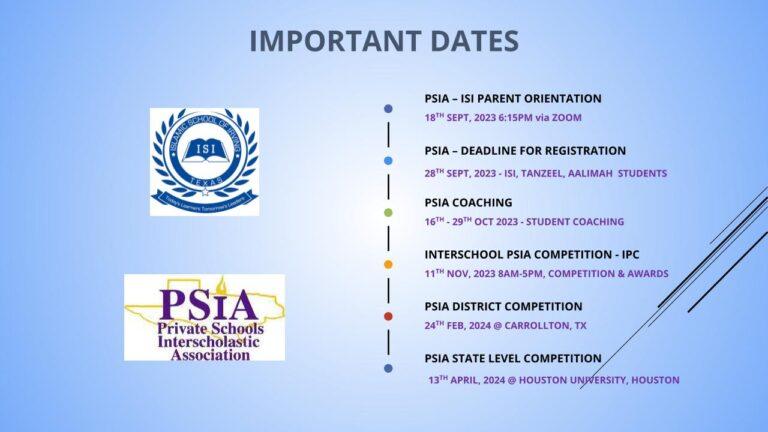- [email protected]
- (972) 812-2230 ext 1100


A thinker’s delight, this 30-minute contest develops mathematical reasoning and knowledge and requires application of problem solving skills toward realistic problems. Any calculator may be used in competition. Two students advance from each grade.
This event is designed to promote creativity and encourage writing skills at an early age. Using a prompt of several pictures, students have 30 minutes to create an original story based on the pictures. Two students advance from each grade
Students use all elements of the dictionary (Merriam Webster Collegiate Dictionary, 11th edition) in the contest room, as they learn practical techniques for extracting and applying resource information. Two students advance from each grade.
The referenced dictionary may be purchased from Texas Educational Paperbacks for a discount to PSIA individuals by calling 1-800-443-2078.
Students are challenged to think quickly and communicate effectively. They organize their thoughts on a topic for three minutes, then speak for five or fewer minutes without notes. Two students advance from each grade
This test has been removed from PSIA and will no longer be available.
Good listening skills enhance any academic area, and the study materials are useful for all students. Contestants may take notes as they listen to the contest script on CD, and then use these notes as they answer objective test questions in 7 minutes. Two students advance from each grade
This event is designed to provide students with experience in obtaining information from visual sources, Test include maps, graphs & charts needed to answer multiple choice questions derived from the 2008 or newer editions of the Nystrom Desk Atlas, which students bring to the contest. The grade 4-8 test includes additional questions from general geography and the adopted atlas. Two students advance from each grade.
Atlas that will be adopted this year is Nystrom Desk Atlas (2018 or newer edition). This atlas may only be purchased through Social Studies School Service. Call 1-800-421-4246, or go to http://www.socialstudies.com.
In a comprehensive, multiple choice, 30-minute math test, students are challenged beyond their grade levels in a variety of general math questions, including algebraic equations introduced in grades 6-8. Two students advance from each grade.
Students observe and draw a still life model consisting of from 4 to 7 objects. Contestants have 45 minutes at the contest site to produce their freehand work of art to be judged by qualified artists/teachers and displayed in an art show during the remainder of the tournament day. Pencil or charcoal is supplied by the contestant. 2 advance from each grade
SAT preparation skills, including word usage, reading comprehension, and analogies, are honed through this challenging multiple choice, 30-minute contest. 2 advance from each grade, except for combined grades 7/8. Grade levels 7 and 8 are combined for competition. Grades 5 and 6 are graded separately.
Please note below is the current list for this year’s competition.
As spelling words are pronounced at approximately five words per minute, contestants may either write or print each word. While 25% of the test words come from outside sources, 75% come from the PSIA Spelling List. A different list is published annually for the three grade groups: grades 2/3, grades 4/5, and grades 6-8. All grades compete separately, except grades 7 and 8, which are combined for competition. The spelling contest is designed to give students exposure to a wide variety of vocabulary words. Preparation for this contest should include instruction in the rules of the English language, definitions, and root words. In addition to learning to spell proficiently, contestants will learn to write clearly and to properly capitalize words. Two students advance from each grade.
Please note below is the current list for this year’s competition.
2023-2024_spelling_list_grades2-3.pdf Link to PDF is present
2023-2024_spelling_list_grades4-5.pdf Link to PDF is present
2023-2024_spelling_list_grades6-8.pdf Link to PDF is present
Contestants in Storytelling hear a short story of about two-to-three 8 1/2 x 11 pages in length (approximately 1000 to 1200 words). Contestants then retell the story before a required audience and an odd number of judges (one or three) within about 6 minutes. The object is for students to demonstrate their ability to speak before an audience, organize detail, and creatively retell the story that they have just heard. Contestants hear a story that they retell for their audience in their own words. This activity encourages the use of recall and also allows young students to bring their own expression and insight to the story. One student advances from each grade.
The contest presents 50 multiple choice problems. Emphasis in science is placed on three main areas: knowledge of scientific fact, understanding of scientific principles, and the ability to think through scientific problems. This last area is a cognitive challenge requiring students to use higher thinking skills in order to arrive at a “solution” or understanding of a problem without previously having been exposed to that particular set of circumstances. Approximately 40% of the 50-itemtest consists of Earth Science questions; 40% of the questions are about Life Science; and about 20%are Physical Science. Some overlapping of these scientific areas may be within the test questions, as well.
The Modern Oratory contest provides opportunities for students to explore the use of the voice and body in speaking situations; to organize ideas; to prepare and deliver a researched speech; and to develop self-confidence.
The contest presents 80 problems requiring the application of four basic operations (+,x,-,÷). Two students advance from each grade
Students select, prepare, and read a literary poetry or prose selection, with introduction, within a six-minute time limit. Presentations are evaluated on aspects of performance, such as appropriateness of selection, introduction, control of presentation, and overall effectiveness. The focus of the contest (poetry versus prose) alternates each year: POETRY IN 2018, PROSE in 2019, POETRY in 2020 etcetera. Two students advance from each grade.
This year will be PROSE, not poetry competition.
A writing prompt will be given and student will plan and write their story on their own paper in the time allotted.
Students observe and draw a still life model consisting of from 4 to 7 objects. Contestants have 45 minutes at the contest site to produce their freehand work of art to be judged by qualified artists/teachers and displayed in an art show during the remainder of the tournament day. Pencil or charcoal is supplied by the contestant. 2 advance from each grade
Each contest is divided by grade level, with some combined grade levels depending on the contest. Each team is comprised of three students and one alternate student.
For questions or comments, please contact [email protected] Thank you.